By Frank Iannamico
The Chinese Type 64 submachine gun was a purpose built suppressed weapon for use in clandestine operations by Special Forces. The weapon was designed during the 1960s for use by the Army of the People’s Republic of China (Communist China). The weapon was Chinese designed and manufactured; not copied from a Soviet design, as many Chinese small arms were. Although uniquely Chinese, many of the gun’s features were borrowed from previous designs: a common practice among successful arms designers.
The Type 64 is a select-fire weapon with a fast cyclic rate of approximately 1,300 rounds per minute. The weapon is chambered for the standard ComBloc 7.62×25 Tokarev pistol cartridge, although special subsonic Type 64 ammunition is required for efficient suppressed operation. The subsonic ammunition has a heavier pointed bullet and has a slightly longer overall length than standard 7.62×25 cartridges. The magazines are the reliable double stack, double feed design similar to the Russian PPS-43 magazines. The steel magazines were produced in both a 20 and 30-round capacity. The magazines are slightly wider than a normal 7.62×25 magazine to accommodate the longer subsonic cartridges. Standard Type 51, 7.62×25 rounds can be fired in the weapon, but it greatly reduces the suppressor’s efficiency. Maximum effective range is approximately 200 meters (218.7 yards).
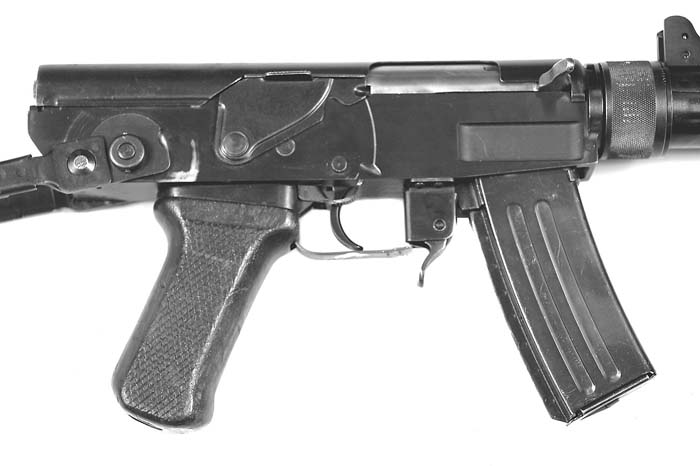
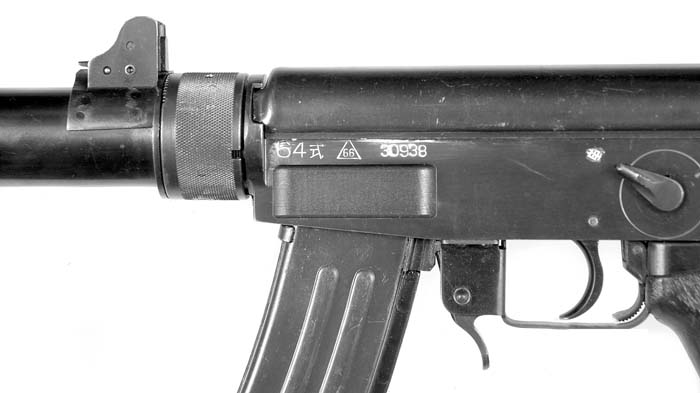
The operating system is the open bolt, blowback configuration; common for most submachine guns designs, but a liability for a suppressed weapon, due to the noise the cycling bolt produces. The breech bolt, recoil spring and plastic buffer design appears very similar to that of the Chinese Type 43 submachine gun, which is merely a copy of the Russian PPS-43 introduced during World War II. The select-fire trigger mechanism is very comparable to that used on the ZB26 light machine gun. A number of ZB26 weapons were purchased from Czechoslovakia and used by the Chinese military.

The Type 64 submachine gun is very well made weapon with very few stamped parts. The receiver is milled from a block of steel and has two AK-style lightening cuts milled out of each side of the receiver. The AK-type top cover is a sheet steel stamping. Both the front and rear sights are mounted by spot welding on the suppressor tube, which provides for a rather short sight radius and places the rear sight a fair distance from the shooter’s eye. The rear sight is a two-position flip up type with ranges of 100 and 200 meters and is protected from damage by protective side ears. The front sight is a hooded, threaded post design and can be adjusted up or down to correct elevation. The two-position mode-of-fire selector is located on the left side of the receiver and can be easily manipulated with the thumb. Rotating the selector to a forward position provides for semiautomatic fire, while the rearward position is for full automatic fire. The fire positions are marked with Chinese characters. The front sling swivel is spot welded onto the left side of the suppressor tube and the rear swivel is located at the pivot point of the buttstock. Interestingly, the suppressed Type 64 submachine gun is serial numbered and has the Chinese State Factory 66 markings on the left side of the receiver. Generally, weapons intended for covert missions usually lack markings of any type to conceal their origins. The weapon and suppressor have a good quality matching dull blue finish.
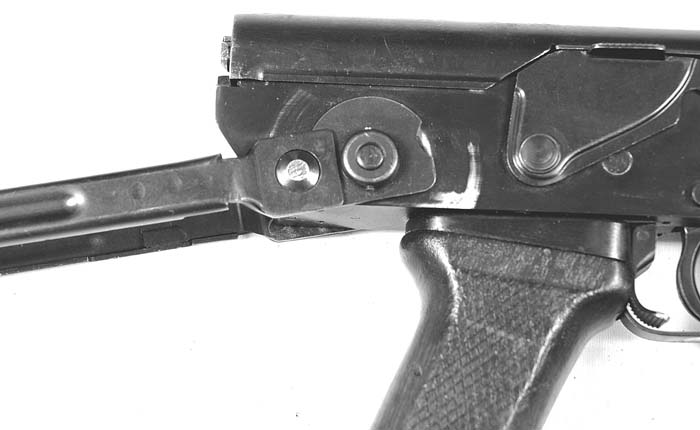
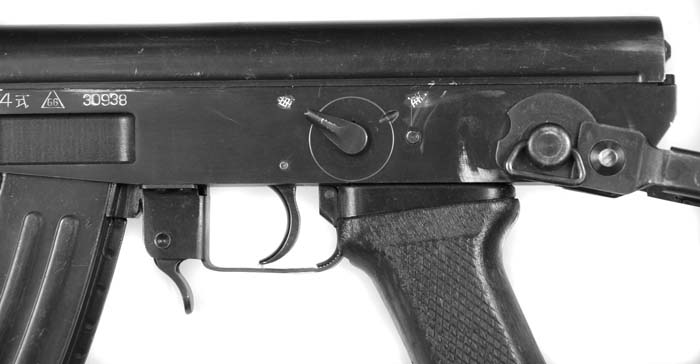
More AK Features
The Type 64 also has a number of features borrowed from the milled receiver Chinese Type 56 assault rifle, which is nearly an exact copy of the third model Russian AK-47. One of the most obvious AK features is the checkered wooden pistol grip. There are two safety devices: the AK style right-side mounted safety lever blocks the bolts rearward movement. This safety allows the weapon to be carried with a loaded magazine. In the event the weapon is dropped on its buttstock, this type of safety is designed to keep inertia from inadvertently jarring the bolt rearward, possibly chambering and firing a cartridge. There is also an SKS rifle type safety lever positioned at the rear of the trigger guard that blocks movement of the trigger when applied. The AK style under folding steel buttstock is released by simultaneously pressing two buttons located at the pivot point. The stock lock mechanism has two half-moon cuts on each side that the spring-loaded buttons fit into, securing it in an open or closed position. The receiver top cover and the pistol grip design also demonstrate AK-47 influence. The magazine release is located under the front of the trigger guard and is also of the same style as the Type 56 (AK) assault rifle – as is the trigger guard itself, attached to the bottom of the receiver with rivets. Like the AK, the Type 64’s bolt is designed to ride on rails milled into each side of the receiver channel. The bolt charging handle extends from the right side of the receiver and reciprocates when the weapon is fired. Even the ribbed magazine displays many AK characteristics.
Maxim Type Suppressor
The Maxim spiral-baffle type suppressor of the Type 64 is an integral design and not an add-on type as used on most submachine guns. The last 4.6 inches of the 9.6 inch barrel has thirty-six, 3-milimeter gas vents drilled into the 4-groove barrel in a spiral pattern. The jacket that covers the barrel has a stack of dished baffles each with a 9 millimeter hole in the center. There are two rods that pass through the sides of the baffles that keep them properly aligned. At the end of the outer tube is a removable end cap. The barrel jacket is attached to the receiver by an interrupted thread design that allows removal by turning the knurled retaining nut one-third turn, and pulling the jacket straight out away from the receiver. The baffle stack is removable for cleaning. The jacket end cap can be unscrewed and the baffle stack can be lifted out as a unit by a bale attached to the baffle assembly. The end cap and suppressor retaining sleeve both have holes for a spanner wrench. Due to the Chinese use of corrosive ammunition, the bore and outside of the barrel and most of the suppressor parts are chromium plated. In addition to significantly reducing the sound of a fired round, the long suppressor effectively serves as a flash hider.
The weapons were made for the Chinese People’s Army and were also offered for export sales. The Type 64 submachine gun was manufactured at State Factory 66 in China. The weapons were exported through China North Industries, commonly known as Norinco. The Type 64 suppressed submachine gun was superseded in service in the 1980s by the Type 85 submachine gun that was also made at State Factory 66. The Type 85 is a simpler and lighter version of the Type 64 weapon. The Type 85 is also chambered for the same 7.62 x 25 mm Type 64 subsonic cartridge, and like the Type 64 submachine gun can also chamber and fire a standard supersonic 7.62×25 cartridge in an emergency. The weapon has an effective range of 200 meters and uses the same blow back, select fire action and is fed by a 30-round box magazine.
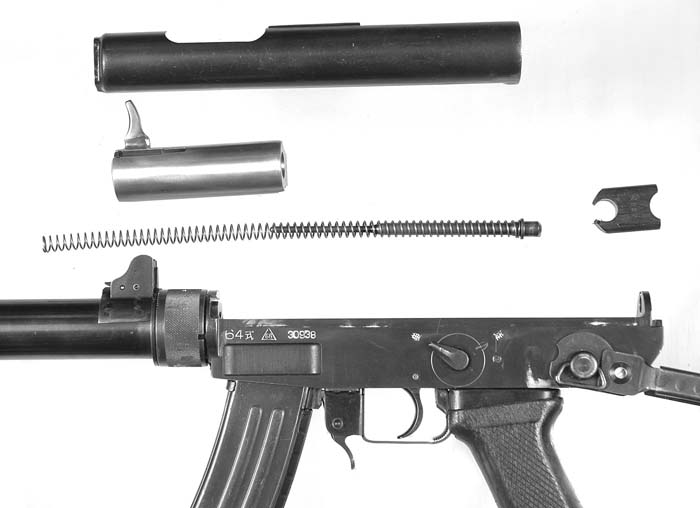
Field stripping Procedures
- 1. Be certain that the weapon is not loaded by visually checking the chamber.
- 2. Remove the magazine.
- 3. Depress the recoil spring guide rod that extends through the receiver top cover.
- 4. While holding the guide rod in, tilt the receiver top cover upward and remove it.
- 5. Push the guide rod forward out of its retaining flange at the rear of the receiver.
- 6. Slide the bolt rearward to the back of the receiver and tilt the rear of the bolt upward and slide it out of the receiver.

Specifications Type 64
Country of origin: Mainland China, for use by the Chinese People’s Army and export sales
Cartridge: 7.62×25mm (Subsonic Type 64)
Operation: Blowback, select fire
Feed: 30-round or 20-round double feed curved box magazine
Weight empty: 7.6 pounds
Length: stock: Folded 25-inches, Extended, 33-inches
Barrel: 9.6 inches
Rifling: 4 grooves, right hand twist
Muzzle velocity: Subsonic below 1,100 fps
Cyclic rate of fire: Approximately 1,300 rounds per minute
Effective range: 200 meters
Manufacturer: Chinese State Factory 66
Exported by: China North Industries Corporation
Special thanks to Al Houde and Beth Crumley of the U.S. Marine Corps Museum, Quantico, VA
| This article first appeared in Small Arms Review V11N9 (June 2008) |











